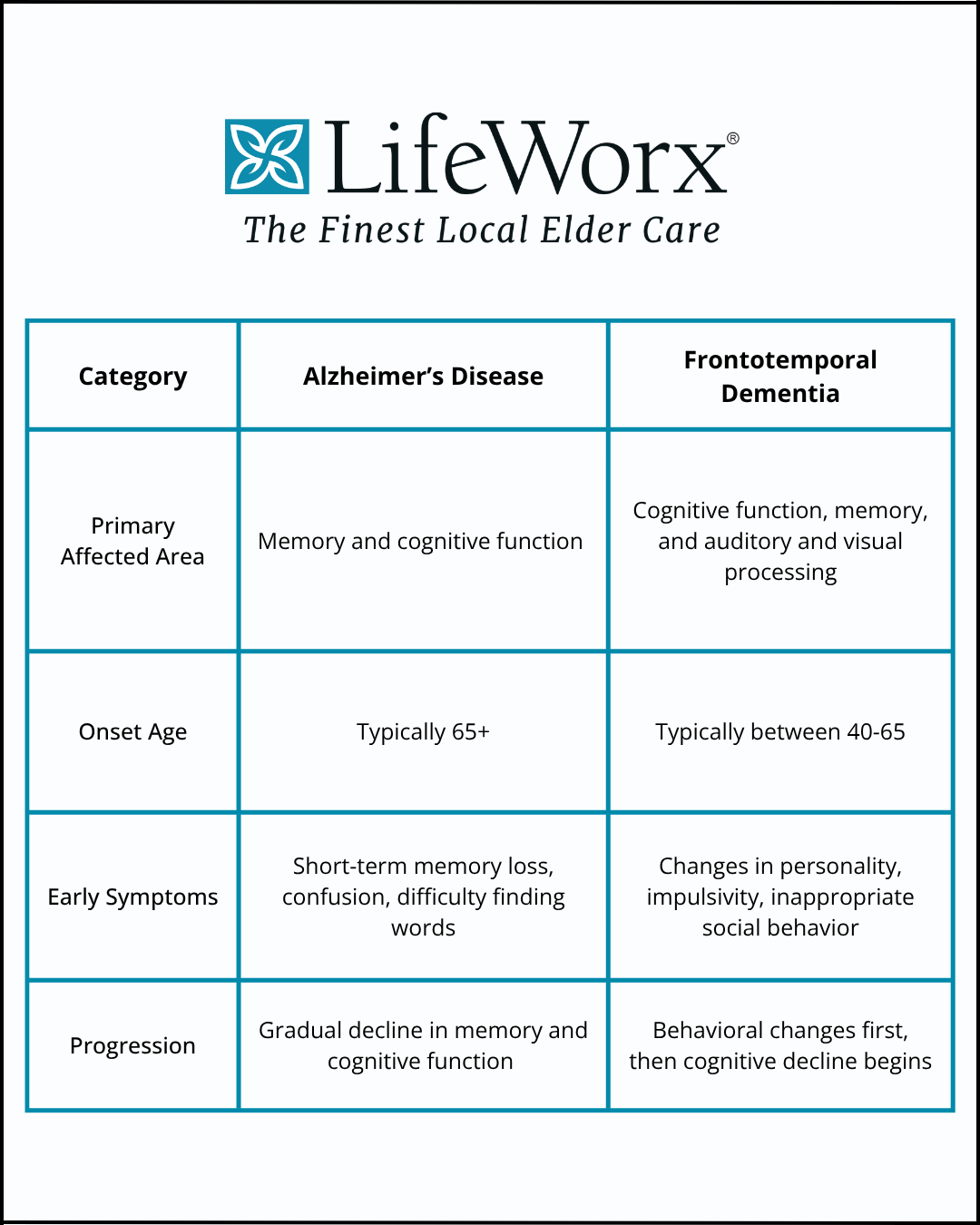
Frontotemporal Dementia: Causes & Symptoms
Key Takeaways
- Frontotemporal dementia (FTD) often begins before age 65 and affects behavior, language, or movement.
- Early signs include personality changes or trouble with speech—often mistaken for other conditions.
- LifeWorx caregivers are trained to support clients with FTD, offering structure, safety, and compassionate care at home.
What is frontotemporal dementia?
Frontotemporal dementia (FTD) is an umbrella term for a group of disorders characterized by progressive damage to the brain’s frontal and temporal lobes. These areas of the brain are responsible for higher-level cognitive functions as well as auditory and visual processing and memory. The deterioration is caused by atrophy of the lobes, leading to changes in both thinking and behavior that gradually worsen over time.
Symptoms of frontotemporal dementia can vary depending on which part of the brain is affected. They can include difficulty moving, unusual or inappropriate behavior, personality changes, and communication problems.
Behavioral and personality changes:
- Impulsive or inappropriate social behavior
- Apathy, depression, or irritability
- Decline in personal hygiene
- Changes in eating habits, such as overeating, overindulging in sweets and carbohydrates, or compulsively putting objects in their mouths
Speech and language problems:
- Trouble understanding written and spoken language
- Difficulty finding the correct words
Movement problems:
- Stiff or rigid movement
- Poor coordination
- Tremors or muscle spasms
What makes FTD different from other forms of dementia?
Frontotemporal dementia is considered the third leading cause of dementia across all age groups, accounting for an estimated 10-20% of dementia cases. It is recognized as one of the most common forms of dementia affecting a younger demographic, with approximately 60% of individuals diagnosed with FTD between 45 and 64 years old.
Due to overlapping symptoms, frontotemporal dementia can sometimes be misdiagnosed as other forms of dementia, such as Alzheimer’s disease, or mental health conditions like depression or bipolar disorder. While other forms of dementia, like Alzheimer’s disease, typically begin with memory-related symptoms, FTD usually presents with changes in personality, behavior, and language first.
Although having a family history of dementia increases the risk of developing FTD, more than 50% of individuals with frontotemporal dementia have no genetic link or family history.
While some cases can progress rapidly within a couple of years, the typical prognosis for frontotemporal dementia is between 5-10 years.

What are the most common types of frontotemporal dementia?
There are three primary variants of frontotemporal dementia:
Behavioral Variant Frontotemporal Dementia (bvFTD):
- The most common variant
- Characterized by changes in personality, behavior, and judgment
- The main symptoms include difficulty planning, impulsiveness, apathy or contextually inappropriate affect, and compulsive eating
Primary Progressive Aphasia (PPA):
- The second most common variant
- Characterized by progressive language difficulties
- There are two subtypes: progressive nonfluent aphasia, which affects the individual’s speech, and semantic dementia, which affects their ability to use and comprehend language
Frontotemporal Dementia with Motor Neuron Disease (FTD-MND):
- The least common variant, affecting 1 in 10 individuals with FTD
- Characterized by disturbances in movement or muscle function, with or without behavior or language problems related to the more common variants
- Includes three disorders:
- Amyotrophic lateral sclerosis (ALS, also known as Lou Gehrig’s disease), which primarily causes muscle weakness or wasting
- Corticobasal syndrome, which causes stiffness and lack of coordination in the arms and legs
- Progressive supranuclear palsy (PSP), which is similar to Parkinson’s disease and includes muscle stiffness, difficulty with balance and walking, and trouble moving the eyes up and down
The unique symptoms and early onset of FTD often force families to make difficult decisions when support is crucial. It’s important to remember that in-home care benefits more than just seniors. These services can support a wide range of needs across different age groups, offering medical assistance and help with activities of daily living, as well as emotional stability in a familiar environment. If you or someone you care about is living with FTD or any progressive neurological disorder, don’t wait to find support. Our experienced care team is here to support you every step of the way.
Contact us today to learn more about how we can help you and your loved ones.

















